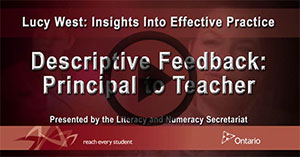
The APPR “Transition”
Update information about the APPR “transition” period is posted at the APPR microsite. You can find links to slides, explanations, check-lists, and other resources.
Final Session of Ongoing Lead Evaluator Training
The final session of the 2015-2016 year of Ongoing Lead Evaluator Training will take place in March:
- March 22, 2016, 8:30a - 11:30a, McEvoy 701, Cortland (register)
- March 22, 2016, 12:30p - 3:30p, McEvoy 701, Cortland (register)
- March 21, 2016, 8:30a - 11:30a, Rodax 8 Conference Rooms, Henry Campus, Syracuse (register)
- March 21, 2016, 12:30p - 3:30p, Rodax 8 Conference Rooms, Henry Campus, Syracuse (register)
Final Session of Ongoing Principal Evaluator Training
The last session of the year for Principal Evaluator Training follows the CSA meeting on April 13th. Resources and a registration link are available at the APPR microsite.
Evaluation and 21st Century Skills
Here are suggestions for evidence that a Lead Evaluator might collect about 21st Century Learning. Look for evidence that students are involved in their learning and engaged in meaning-making; look for authenticity in the work students are doing and the audience to whom they are presenting; and look for connections with the real world outside the classroom walls.
Waivers Extended
Districts that are still operating on §3012-d do NOT have to apply for a second waiver. All waivers have been automatically extended and cover the entire school year. You must get a new plan submitted for approval by July 1st.
§3012-d To-Do List
If you are still working on the development of a new §3012-d plan (which has to be submitted for approval by July 1st), here’s a list to help you keep track of the decisions you have to make.
Behaviors of Instructional Leaders
Tim Westerberg identified ten behaviors of instructional leaders, which he describes in detail in his book Becoming a Great High School. That book, by the way, is included in the ASCD collection. These behaviors aren’t just for high school settings:
- Articulate a clear vision of what effective instruction and assessment look like in this school.
- Fight isolation and fragmented effort.
- Remain intimately familiar with the technical core of schooling
- Model high-quality instruction
- Conduct observations and walkthroughs on a daily basis
- Model effective feedback
- Play a key role in planning, implementing, and evaluating professional development
- Actively participate in building-level professional development
- Build productive relationships
- Delegate management duties
Lake Wobegon
Don’t worry that Garrison Keillor is retiring, Lake Wobegon lives on in the evaluation systems in our country. The Widget Effect is alive and well in teacher and principal evaluations, according to this paper. In most states, less than 3% of educators are rated below proficient (or effective).
The “Right” Evidence and Effective Feedback

In our classroom visits we are focused on collecting as much evidence as possible. Lucy West suggests that we also keep in mind the goal of collecting the most important evidence – evidence of student learning. She also describes the kind of discussion a principal and teacher might have about student learning. While she uses an example from math class, her recommendations are generalizable.
Follow Us Online |
||||||
| OCM BOCES Instructional Support (IS) offers specialized E-Newsletters centered around our different departments. To view the choices or to sign up, visit our E-News Sign-up page. You may unsubscribe at any time. | Visit our Website |
|||||
